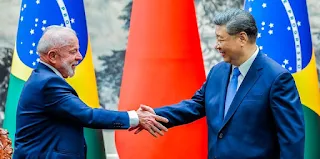During a ceremony at the Great Hall of the People in Beijing on May 13, 2025, the Minister of the Civil House, Rui Costa, and the Minister of the National Development and Reform Commission of China, Zheng Shanjie, signed a memorandum of understanding that marks the first phase of a broad cooperation plan between Brazil and China. The proposal seeks to deepen bilateral relations, especially in areas such as infrastructure, technology and innovation.
The plan, consolidated after Chinese President Xi Jinping's visit to Brazil in November 2024, is aligned with strategic Brazilian programs such as the New PAC, the New Industry Plan for Brazil and the Ecological Transformation Plan. The partnership foresees the creation of bilateral forums to discuss and promote investments in sectors such as railways, subways, ports, airports and highways. China will also be able to participate in infrastructure auctions and concessions in Brazil.
According to Rui Costa, the intention is to transform these agreements into concrete benefits for the Brazilian population, such as job creation, professional training, investment attraction and technological development. The proposal also aims to encourage the installation of research and production centers by Chinese companies in Brazil, with partnerships with local institutions.
In addition to the signing ceremony, Rui Costa participated in a series of preparatory meetings in Beijing and Shanghai with Chinese authorities and representatives of companies in the health, infrastructure, technology and energy sectors. In Brazil, prior meetings with the Chinese ambassador and Chinese businesspeople reinforced the mutual interest in areas such as industrial production, shipyards, energy, artificial intelligence and public concessions.
President Lula and President Xi Jinping attended the signing of the memorandum. Both highlighted the historic importance of the initiative and the strengthening of friendship between the countries. Lula described the moment as essential for a more just and sustainable world, highlighting the role of Brazil and China in confronting unilateralism and global protectionism.
The cooperation plan covers several fronts: multimodal cargo transportation, naval industry, production of medicines and vaccines, science and technology, clean energy, high-voltage electrical transmission, environmental preservation, disaster management, professional training and smart cities.
With around 30 bilateral acts signed, the agreement represents an important step towards strengthening Brazil-China relations and signals a new cycle of economic and technological development for Brazil.


Comments
Post a Comment